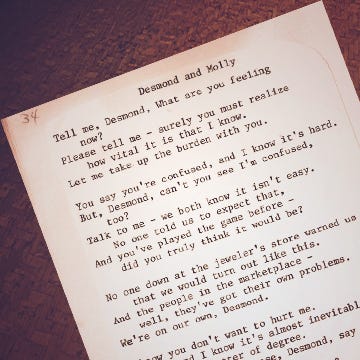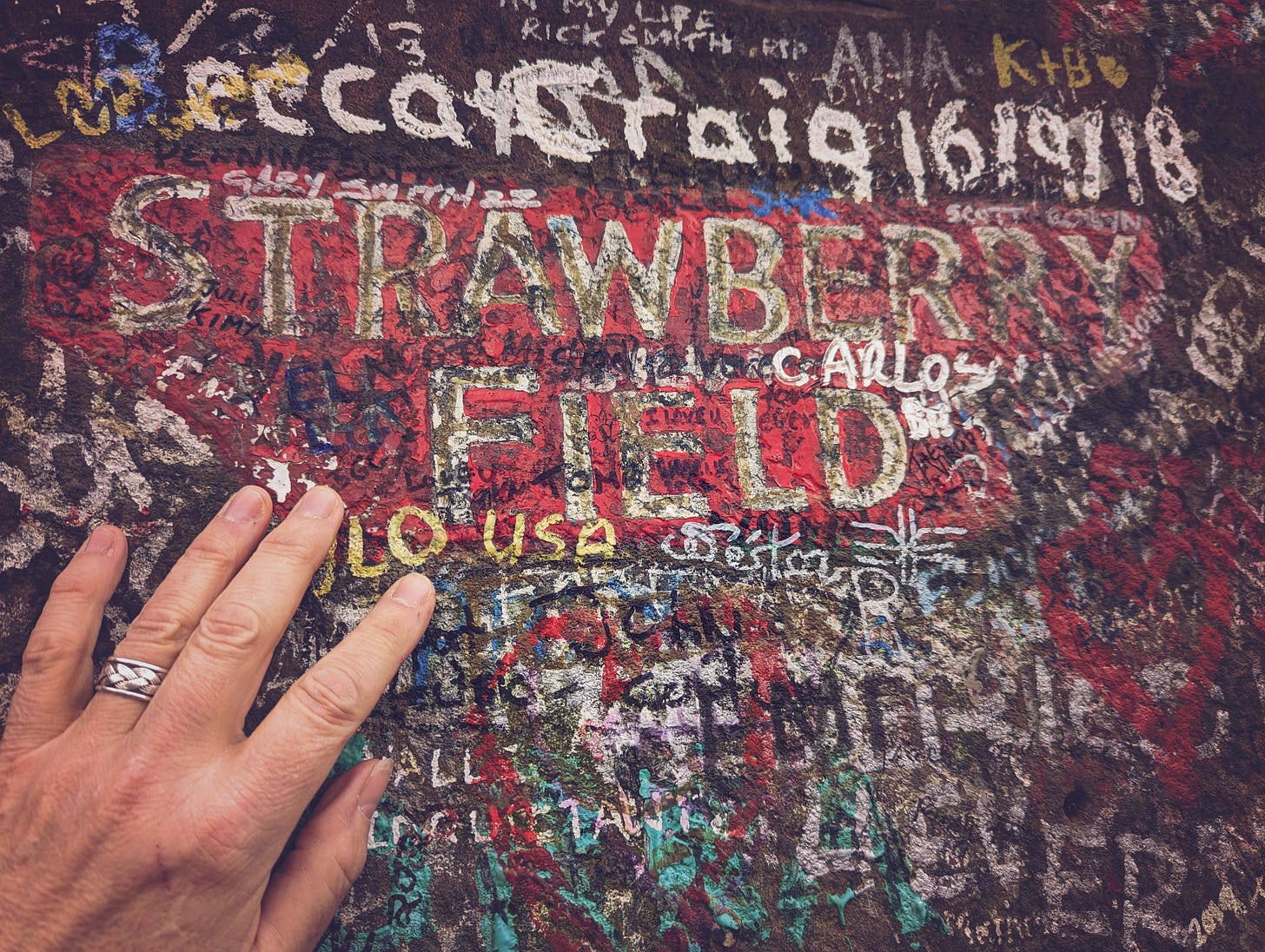“The Beatles weren’t a band, they were a miracle” ~ David Gilmour
I'm a Beatles writer/scholar specializing in the study of Lennon/McCartney. I'm also a mythologist, a singer/songwriter, a former political strategist, and the daughter of a passionate rock music historian, and most importantly, the proud bearer in good standing of a Liverpool Central Library card and Merseyside Transit pass.
My very simple website is here.
“The Beatles weren’t a band, they were a miracle” ~ David Gilmour
ABOUT THE ABBEY
In which I establish my credentials to speak on All Things Fab. Fair enough. I will tell you about the Listening Chair.
In our home, there is a wall of records, floor to ceiling, and a chair in the corner. This is the Listening Chair. My father is a music historian. He specialises in the cultural impact of popular music in the ‘50s and ‘60s. He gets foundation grants to study this topic. These grants are used to buy records. He buys a lot of records, hence the wall and the Listening Chair. I buy a lot of records with these grants, too, although this is technically in violation of the grants because I buy music that’s new. I’d buy the older music, too, but, well… I don’t need to. We have most of it at home already.
One day, I ask my father about The Beatles. He smiles. I can tell he’s been waiting.
He takes me to the Wall of Records, seats me in his Listening Chair and pulls down Sgt. Pepper. He slips the record out and hands me the sleeve. I study the cover. I’ve never seen an album cover like this before. My father tells me who the people on the cover are. We sit, me in the chair and him on the floor, and listen to the album. When it finishes, he leaves the needle stuck on the hidden track in the album groove. I have nightmares about maniacal voices repeating endlessly. I learn that music can be dangerous.
This is my introduction to the most important music ever recorded.
Here’s another story.
My high school debate partner buys the two-volume Capitol “Rock and Roll Music” compilation. This is not supposed to be the music of our youth. It was made before we were born. But it is the music of our youth because we’re the first generation to care more about our parents’ music than our own. We play “Rock and Roll Music” on the bus to debate tournaments. Pretty soon we play only “Rock and Roll Music” on the bus to debate tournaments. We learn the harmonies. There are four of us and we pretend Ringo can sing harmony, so it works. I’m the only one who can hit the high notes, so I take Paul’s parts.
Our debate coach is delighted. She tells us her Beatles stories. We wear out the cassettes and buy new ones. We obsess.
I learn about the White Album. Like John, I’m bored in class. Instead of the Daily Howl, I write poems about Desmond and Molly.
I fight with my debate partner and make an apology mix tape that opens with “We Can Work It Out.” (but like Paul, what I really mean is “do it my way or else”). My debate partner sends me a mixtape back that opens with “Getting Better.” We aren’t good at talking about hard things, so Lennon/McCartney becomes the language of our intimacy. He is John and I am Paul. In later years, with a different partner, this will change. I will be John and he will be Paul.
I grow up. The Beatles become background for awhile, until they sweep me away once again. I become a Beatles writer and make the pilgrimage to Liverpool (and to London and to Hamburg).
Everyone in Liverpool seems to have a story, too, but theirs are different. Their stories are about how they’re directly connected to Them. It’s still first generation, if barely — “I saw them at the Cavern.” “I was at the Fete.” “I went to school with Paul and George at the Inny.” But more and more, it’s second and third generation. “My dad knew...” “My grandmother once...” This is both good and bad.
In Hamburg, I walk the streets of the Reeperbahn. In Liverpool, I lose myself in the ecstatic mystery cult of the Cavern. I touch the gate at Strawberry Fields. I stand in the exact spot at St. Peters Church Hall where John and Paul met and I weep for the miracle of it. For what it was. For what it is. For what’s slipping away.
There’s something singular in all of this. Something mysterious and utterly unrepeatable. It’s why most everyone who tells me their story talks in a hushed voice, struggling to find words to get across with sufficient intensity how important, how magical their individual experience is.
Sometimes they stop, frustrated, and look at me expectantly. I’m the Writer after all. Finding the words for transcendent experience is in my job description. I’m meant to be expressing what non-writers can’t express for themselves, so they can point to a line or a paragraph or a chapter and say, “This. This is how their music feels for me, why it matters. This.”
We… meaning Beatles writers… are failing them in “this.”
Sixty years on, the magic endures, but it’s in danger. Mainstream Beatles writing has become sterile. Flat. Petty. Divisive. Smug. Held hostage by the “click bait” internet culture of lists and rankings and rivalries in the name of getting page views. “John or Paul?” “Revolver or Pepper?” “Mop tops or psychedelic sages?” The answer is Both/And. Always Both/And.
The magic is still there, but it’s buried under rancid piles of irrelevancy. I recently argued had a polite British difference of opinion with a Beatles tour guide who grew up in Liverpool in the '50s. I wanted to talk about the magic. He wanted to prove he was the superior expert by quizzing me on trivia. I don’t care (much) that Paul and Ivan Vaughan share the same birthday. I care why people from all over the world, including me, get chills at the thought of standing at the roundabout on Penny Lane.
Somewhere along the line, we’ve lost the magick.
And this… this is why The Abbey.
My goal is simple: I want the magick back. I want the extraordinary, breathtaking miracle that these four remarkable, complex, brilliant men gave to all of us, at staggeringly high personal cost to themselves and those around them. I want that magick mainlined into my bloodstream and into the bloodstream of our world as a counterpoint to the darkness.
I think this is the greatest story ever told. I think John was right, minus the nonsensical backpedal about televisions, that The Beatles are the most important cultural happening in recorded history. I think their story is a sacred mythology, a contemporary origin story for our modern culture and a foundational text of Western civilization. We are all living in the world The Beatles created. Getting it right matters, if we’re to understand ourselves.
My goal at The Abbey is to offer a serious, substantive and … and this is important… beautiful platform, because I believe that the truth of the Beatles can only be found in mystery and in magick and in beauty. And most of all, in love.
“People say, “Do you believe in magic?” And I say, “I’ve got to.” … The whole thing was magical. And I think the whole Beatles story has elements of that every inch of the way.”1 — Paul McCartney
https://www.gq-magazine.co.uk/culture/article/paul-mccartney-interview
Full quote: People say, “Do you believe in magic?” And I say, “I’ve got to.” And I don’t mean, you know, Gandalf or wizardry or that sort of thing necessarily. For me, it’s how life can be magical, these things that just came together. Me and John knowing each other, the fact that both of us independently had already started to write little songs... I said to him, “What’s your hobby?” I said, “I like songwriting,” and he said, “Oh, so do I.” You know, no one I’d ever met had ever said that as a reply. And we said, “Well, why don’t you play me yours and I’ll play you mine.” That is most unusual and most fortuitous, the fact that we should meet and get together. And then when we got a recording contract and we were down in London and we realised that there were people down in Tin Pan Alley, near Charing Cross Road, who did this for a living and who wrote for people. And that got very exciting. So if we wrote something we weren’t using, we’d give it to Billy J Kramer or Cilla Black. The whole thing was magical. And I think the whole Beatles story has elements of that every inch of the way.
https://www.gq-magazine.co.uk/culture/article/paul-mccartney-interview







